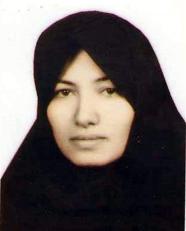
An Iranian woman sentenced to death by stoning for adultery says she will sue two German journalists who have been jailed in Iran for interviewing her son.
“I have told [my son] Sajjad to sue the ones who have disgraced me and the country,” Sakineh Mohammadi Ashtiani told reporters in the north-western city of Tabriz where she was tried.
Ashtiani was briefly allowed out of prison to have dinner with her two children.
Following the dinner, she told reporters that she was not tortured while in prison, adding “these are all rumours”.
She named those she wants to sue as “the two Germans”, along with her former lawyer Mohammad Mostafaie, Germany-based anti-stoning campaigner Mina Ahadi and her late husband’s convicted murderer Issa Taheri.
“I have a complaint against them,” she said.
The two German journalists from Bild am Sonntag were arrested on October 10 for interviewing Ashtiani’s son and family lawyer, who were also taken into custody.
Iran says the two entered the country on tourist visas and failed to obtain the necessary accreditation for journalists from the authorities before “posing as reporters” when they contacted her family.
Ashtiani, who has been jailed since 2006, was speaking to foreign media based in Iran at a brief conference organised by judiciary officials.
“I have come in front of the cameras at my own will to talk to the world,” she said.
“I am willing to talk because many people exploited [the case] and said I have been tortured, which is a lie.
“Leave my case alone. Why do you disgrace me?”
Ashtiani said the Germans had “embarrassed” her, but did not say exactly why.
“I have a complaint about the two Germans who have embarrassed me. Why did they come here? Why did they come here and pose as journalists?” she told reporters.
Ashtiani’s son Ghaderzadeh faces his own court case after talking to the German reporters about his mother’s sentence and has been released on bail while a court considers his case.
He has since spoken to reporters to plead for clemency for his mother.
“In my opinion my mother is also guilty but since we have lost our father we do not want to lose our mother too,” he said.
“Consequently, we ask for a commutation of the penalty.”
Ashtiani was sentenced to death by two different courts in Tabriz in separate trials in 2006.
Her sentence to hang for her involvement in the murder of her husband was commuted to a 10-year jail term by an appeals court in 2007.
But a second sentence to death by stoning on charges of adultery, levelled over several relationships, notably with the man convicted of her husband’s murder, was upheld by another appeals court the same year. ABC

Leave a Reply
You must be logged in to post a comment.